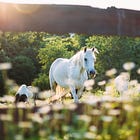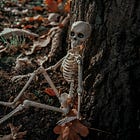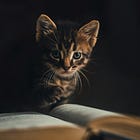Interview: Hazel Hitchins
On humor, animal familiars, and the magical women of folklore
Welcome back to another Wizard of Claws interview!
I’m delighted to introduce you to our first author from outside the vegan/animal rights bubble. Hazel Hitchins’ debut novel, Babs & Aggie: The Good, the Bad and the Vegan, came onto my radar by way of bookstagrammer @ameliaveganreader. A riotous contemporary fantasy, the story follows old friends (and amateur sleuths) Baba Yaga and Black Agnes as they seek to liberate their vegan friend from her abusive “vegan” partner. As you can imagine, I was desperate to pick Hazel’s mind, so let’s not dally any longer with this intro. Onward!
General Questions
Can you share a little bit about yourself, including how you became interested in creative writing?
I’m a writer from the UK, best described as a “woman-of-a-certain-age”. I live in Wales with my normal family, my normal-ish cat and my entirely abnormal laundry pile.
Stories have been in my blood since birth. One of my earliest memories was of my mum tiptoeing along a specific route with me when putting me to bed, because in my imagination, we were navigating a field of sleeping wild horses.
Many of us have childhood dreams of becoming writers. When did you decide to give it a shot?
I first announced I wanted to be an author at the age of seven. Fourteen years later, I gained a degree in creative writing and then…nothing. I took an office job, met the boy, married the boy, got the mortgage, etc. I’m ashamed to say that it took the untimely passing of my mum a decade ago to remind me that we’re not promised tomorrow, and if I was ever going to write, NOW was the time.
As a freelance editor, what’s the piece of advice you most frequently give to authors?
I have two main pieces of advice, which are linked. Firstly, sit your backside in the chair and write. Until you get those words committed to the page, you’re not a writer; you’re a dreamer, which is fine up to a point, but dreams alone won’t see you complete your book.
Secondly, many writers stall because they’re striving for perfection. Perfection is a myth. Your work is never going to be universally adored. There will always be people who don’t like what you’ve written, and that’s fine. They’re entitled to their wrong opinion.
What makes a good editor/author relationship?
I’ve been on both sides of this, and I’d say communication is key. As an editor, you need to remember that the writer has put their heart and soul onto the page for you, and a certain degree of consideration for that should be engaged when giving feedback. That doesn’t mean sugar-coating anything; it just means discussing things sensitively and explaining the ‘why’ behind your feedback.
From the other side, I’ve received difficult feedback as an author. I find it’s best to keep in mind that your editor genuinely wants your work to be as polished as possible. Their feedback is not a personal attack on you. You may also feel some resistance to their suggestions, which is perfectly natural. Sit with them for a day or so and then look at them again. And remember, if you genuinely disagree with their choices, you can always say no.
In what ways can/does fiction shape the way people think about animals?
I think there’s a tendency for writers (myself included) to anthropomorphise animals, which can have the positive effect of promoting empathy for animals. The downside is that it can lead to a demand for certain pets from people with an unrealistic view of what owning a pet will entail. A classic example is that of the surge in demand for Dalmatians following the release of the Disney film, 101 Dalmatians, many of which were given up when the owners realised they couldn’t care for them.
On the flip side, writing about animals without this human lens can also have a detrimental effect. The hunting of sharks increased dramatically following the release of the film Jaws, due to the portrayal of the shark as a ravening monster.
Ultimately, I think, as with all our interactions with animals, we should be considerate of the impact we might have.
Story Questions
Of all the mystical ladies in folklore, why were Baba Yaga and Black Agnes the right ones to star in this story?
I grew up reading fairy tales, and then British folklore, which then spread to European folklore and beyond. I remember reading the terrifying tales of ‘Black Annis/Agnes’ with her blue skin and iron claws, and Baba Yaga, with her sharp teeth and pointed fingers. Something didn’t sit well with me about these stories and it wasn’t until I read Terry Pratchett’s books (particularly, Wee Free Men) that I realised what it was. The thing all these ‘hags’ and ‘crones’ had in common was that they were old. Much as the shark in Jaws, they were portrayed as monsters, presumably because they weren’t cute and fluffy, and their outspoken attitudes represented a threat.
When I got the idea to write a story with witches in it, I knew I wanted to address that. I chose Aggie because she was the first folklore witch I remember reading about, and as, in Slavic folklore, Baba Yaga also embodies chaos and the unpredictable force of nature, I thought she would she would be the perfect foil for the Aggie I envisioned.
Despite dealing with a heavy subject matter, you manage to inject humor to keep the tone light and alleviate tension. What’s the secret to balancing comedy with drama?
That’s a tricky one, and I think you’re right to call it a balance, though I’m not sure it’s a secret. For me, it’s simply realising that life is going to send drama your way. It’s also going to send opportunities for laughter. The best we can do is hold on to those happy moments and use them to ride out the harder ones. That’s what I’ve tried to mimic by injecting humour. I explore this topic as a whole in more depth in the second Babs & Aggie (currently in progress).
I’m endlessly fascinated by the concept of familiars. Having read quite a bit about the persecution of “witches” throughout history, it seems that men in power have always been unsettled by women who love and respect animals. Why do you think women, magic, and animals have been so closely associated with one another across cultures and centuries?
Another fascinating question. I think magic, women and animals tap into a primal fear because they can’t be controlled. Witches' familiars tend to be depicted as traditionally ‘unbiddable’ creatures — cats, goats, birds etc. When you team that with the role of the ‘handywoman’, effectively the midwife who would help at the edges of life, namely birth and death, and would develop an impressive catalogue of herblore to help at these times, then you’ve certainly got the appearance of magic. And for a particular type of person, that can feel threatening. Historically, this has led to women having limitations placed upon them (such as requiring them to apply to the bishop for a license to practise midwifery) or being persecuted (witch trials, need I say more). One might argue that the limitations and persecutions continue in various forms today.
Babs says at one point, “House is my heartbeat, my darling one, who provides me with home and warmth and care. This is the way with familiars and if we lose them, we lose part of our selves.” This relationship between magical folk and animals (even sentient part-animals like House) mirrors our real-world relationship with companion animals. Sometimes I take the time to just gaze at my dog, and I can’t help but marvel at how incredible — some may even say magical — the animal kingdom is, that us two wildly different species can cohabitate together and form deep bonds. Were the familiars in this story at all inspired by your own experiences with animal companions?
I think so. I have always had animals in my life — various dogs, cats, and even an unexpected horde of hamsters. They provided comfort and companionship in my formative years (with the exception of the hamsters, who mostly provided chaos). I’m now the willing servant of a diva of a cat who has wrapped the entire household around her toe-beans. Despite her prima donna attitude, she instinctively knows when one of us is upset or sick, and she seeks us out to make us feel better — in the case of my youngest son, this involved sitting on him so he’d keep still for long enough to recover. Likewise, I love that she trusts me to make her better when she’s unwell. I think that once you’ve experienced that connection, it is going to affect you. And Aggie’s despair at the loss of her cat is something many of us can relate to.
It’s incredibly rare to see vegans represented in fiction. And when they do appear, it’s nearly always to be the butt of the joke or to be “corrupted,” as I call it, by eating or killing animals at some point in the story. First of all, I wanted to thank you for creating Sophie, a vegan character who’s actually believable! The community of bookish vegans is small (but growing!), so you have no idea how much we appreciate seeing vegans represented on the page as normal people. Not being vegan yourself, how did you approach the research process to create such a realistic vegan character?
There’s a famous proverb about a jar of spiders. They all scuttled around the bottom of the jar, bumping into each other, accepting the fact that this was their life, until one spider managed to scale the glass. Just as the spider reached the rim of the jar, the other spiders saw its success and worked together to climb up the side and pull the spider back down. They then pulled off its legs so it would never try to leave again.
You may wonder what this has to do with your question, but it summarises the mindset I try and adopt with everything. There are too many spiders ready to pull others down for doing something different to them. They feel it reflects badly on them for not doing the same, but ultimately, it is simply a reflection of what matters to the person scaling the jar. People choose veganism because it matters to them, not because they think they are better than the other ‘spiders’, and that’s what I wanted to get across with Sophie. She is just a normal person who has made some poor relationship choices. Her veganism, however, is something she feels at her core — she doesn’t push it on to anybody else, but just quietly lives her life, sticking to her beliefs.
Given what I said in the last question, you may think I’d have a gripe with the Vegan as a character, but I don’t. I think it’s important to show that vegans — or “vegans” in this case — can also be flawed people (aka normal…okay, well, maybe he’s not the best example of normal). Anyhow, speaking of the Vegan, why’d you decide not to name him?
I’m so glad you picked up on the fact that I didn’t name him. It was an active decision not to do so, partly because there’s something visceral sounding about the word ‘vegan’ which belies its actual meaning. It can be spat out in anger in a similar way to the words villain and evil, which is why I felt it suited him. Mostly, though, he didn’t get a name because he doesn’t deserve one. My way of thinking is that my characters have to earn their names by showing the ability to change and improve (which is why Little Miss Magick ultimately gets a grudging name).
Almost every vegan has learned that the word “vegan” is a good way to send people running. Some of us therefore choose to eschew the word by calling ourselves plant-based or avoiding labels altogether. Did you have any concerns about including “vegan” in the book’s title, especially considering this is your debut novel?
I did worry about this, which is why I made it clear on the back and from the very first mention of him that he was a fraud and simply using the label of vegan as a method of control. It’s why I also wanted Sophie to be a realistic depiction of a real vegan, so that it was clear this book wasn’t an attack on veganism.
I also checked with several vegan friends about whether they would find the use of the term vegan in this way offensive. Their view was that it wasn’t in any way offensive. In their words “Vegans can be nasty, too,” (even though the Vegan isn’t actually vegan).
Ultimately, to paraphrase Babs and Aggie when they were asked if they hate vegans:
“Do we hate vegans, Agnes?”
“Vegans? No. It’s a***holes we can’t stand.”
And I think this comes across in the book.
Have your opinions on veganism changed through the process of writing the book?
In some ways, yes. I’ve realised that creating vegan dishes isn’t as difficult as many people assume it is. It has increased my curiosity about food in general. I’ve always enjoyed cooking, but writing the book has encouraged me to look at my lifestyle. I’m now looking at ways to remove ultra-processed foods from my diet, which has involved including more plant-based meals into my repertoire.
Final Questions
How can readers find you and your stories online?
You can find me online on my website.
On Instagram, Facebook and Threads under the handle of @hazelhitchinsauthor and on Bluesky at @hazelhitchins.bsky.social.
Babs & Aggie — the Good, the Bad & the Vegan is available from:
And in the UK, it’s even available to order from your favourite indy book store.
Any upcoming projects?
A second Babs & Aggie novel is in the works, and I’m also working on a Babs & Aggie novella, which I’m hoping to release for Christmas. Alongside this, I have several ideas for YA novels, though I suspect I would release these under the name of Siwan Freeman (under which I previously released a collection of short stories), simply because they’ll have a different feel to them.
Anything else you’d like to share?
You can keep up to date with all my writing news and get monthly, humorous, (semi) fictional stories about my life with my cat, by signing up to my newsletter. The link is on my website.






